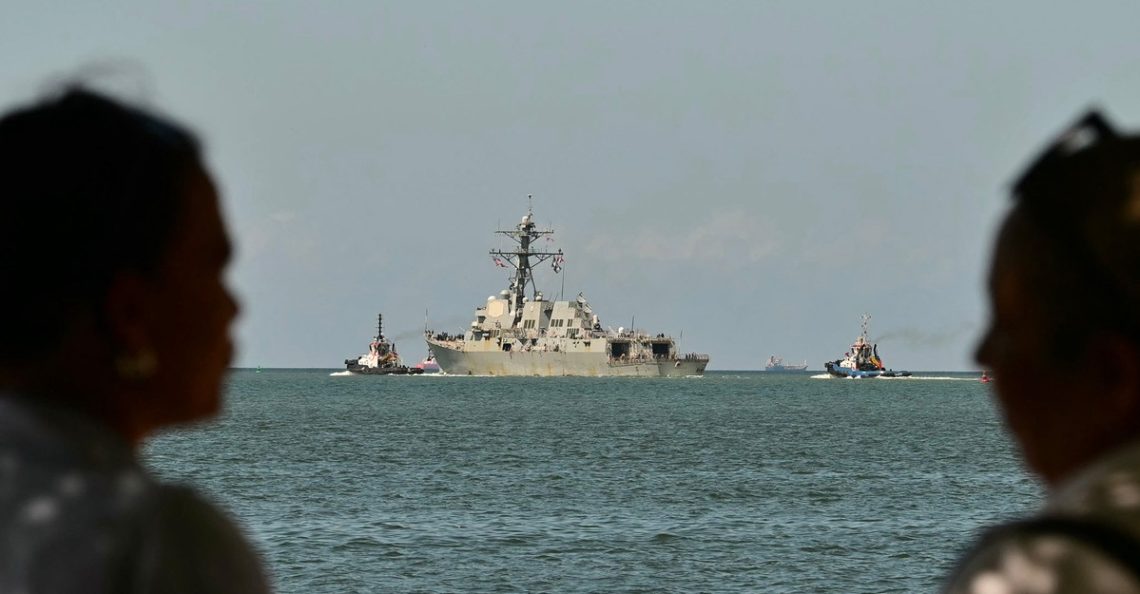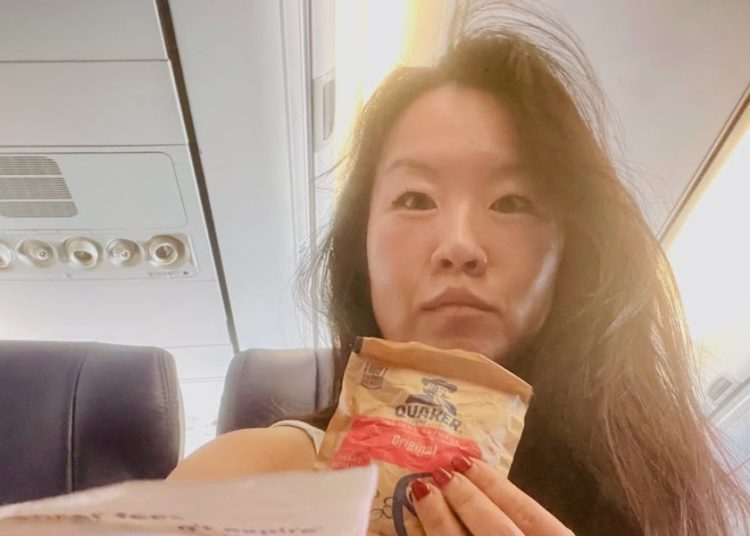President Donald Trump gathered top advisers and military aides around the Resolute desk early last month, then patched in Richard Grenell, his envoy for Venezuela. On Trump’s return to office, the president had given Grenell a clear mission: get a deal that would give U.S. companies access to Venezuela’s enormous oil and mineral wealth and force tougher action on gangs and drugs. Grenell had made some headway, securing the release of American prisoners from Caracas and the resumption of flights for deported migrants, by working direct lines he had established to President Nicolás Maduro, Venezuela’s socialist strongman.
But Secretary of State Marco Rubio had been championing a different approach. The former senator from Florida, who also serves as the president’s national security adviser, has a long-standing abhorrence of leftist Latin American dictators and has advocated for Maduro’s ouster, a call backed by the legions of Venezuelan and Cuban exiles in Miami. To bring his arguments in line with Trump’s domestic priorities, Rubio has portrayed the Venezuelan leader as the head of a narcotics enterprise running drugs into the United States, as well as an agent of the destabilization that fuels migration.
As a justification for using military force, the drug rationale was awfully thin: Venezuela is not an important player in drug production, even though it allows cartels to use the country as a transit point. But by presenting a move against Maduro as a way to combat illegal trafficking, Rubio got the president’s attention. In early September, Trump began authorizing strikes on small boats off the coast of Venezuela and in the Pacific that were allegedly ferrying drugs or cartel members, so far killing at least 65 people in 16 attacks.
White House Deputy Press Secretary Anna Kelly told us that the strikes have been “against designated narco-terrorists, as affirmed by U.S. intelligence,” and that the president was using his authority to do what was necessary to prevent drugs from reaching the United States. But the administration has offered little evidence to support its claims.
By the time Trump talked with Grenell from the Oval Office, with Rubio nearby, he appeared ready to decide between negotiation and confrontation. In a meandering call, details of which have not been previously reported, he spoke warmly of Grenell’s work as the Trump-appointed head of the John F. Kennedy Center for the Performing Arts and praised him for his willingness to execute orders. He also delivered a blunt message, according to two people familiar with the exchange: Stop talking to Maduro; we’re going to try something new.
In the weeks since, the Pentagon has mustered the largest military buildup in the Caribbean since the Cuban missile crisis, in 1962, and the world’s largest aircraft carrier is headed there from the Mediterranean. The USS Gerald R. Ford will join eight other warships, some 10,000 troops, fighter jets, sophisticated drones, and a nuclear-powered submarine. The accumulation of such extraordinary firepower has worried some Trump allies, who argue that a military campaign to depose Maduro would be at odds with one of the president’s core campaign pledges.
“President Trump ran on an agenda of ‘America First,’” one Trump ally who has been working on Latin American–policy issues told us. “Unfortunately, people in his administration are more focused on a ‘South Florida First’ agenda.”
With a U.S. armada floating off Venezuela’s shores, Maduro now faces the choice of whether to stay and suffer the potential consequences or to flee. And the United States faces the prospect that Trump, who has criticized America’s past “forever wars” and spent much of this year focused on ending major foreign conflicts, might be about to start one in his own backyard.
Since his first term as president, Trump has considered Venezuela a problem: a close ally of Communist Cuba run by a leftist demagogue with support from Russia and China in a hemisphere dominated by the United States. “If the goal is increasingly to have U.S.-aligned leaders, or at a minimum leaders that are not actively aligned with China, Russia, and Iran, then Venezuela sticks out like a sore thumb,” a senior administration official told us.
Speaking to Miami’s Venezuelan American community in early 2019, Trump suggested that the fall of the regime in Caracas could topple a chain of dominoes: “When Venezuela is free, and Cuba is free, and Nicaragua is free, this will become the first free hemisphere in all of human history,” he said.
Ryan Berg, a Latin America expert at the Center for Strategic and International Studies, in Washington, D.C., told us that Trump and his advisers are united in their desire to beat back Chinese encroachment in the U.S.’s sphere of influence, much as the Monroe Doctrine of the 1820s sought to end European interference in Latin America. Hence Trump’s threats to annex Panama, Greenland, and Canada. “Trump instinctively understands that if the U.S. is not the top dog in the Western Hemisphere, it can’t be an effective global power,” Berg said.
Trump has consistently urged his advisers to ensure future U.S. access to the extractive riches of Venezuela, home to immense mineral supplies and the world’s largest proven oil reserves. But getting rid of Maduro, who has stayed in power since 2013 through a combination of corruption, repression, and electoral fraud, has proved difficult.
By 2019, Trump and then-Senator Rubio had put their insult-hurling presidential-campaign rivalry behind them and were collaborating closely on Latin America. Like others around the president with ties in South Florida, Rubio, the son of Cuban émigrés, had long hoped to see socialist holdouts in Latin America replaced by friendly regimes.
Trump initially threw his support behind the Venezuelan opposition leader Juan Guaidó, but the president’s hopes of seeing Maduro swept from power soon faded. Trump later derided Guaidó as weak, at one point comparing him to Beto O’Rourke, the perpetual Democratic candidate from Texas. John Bolton, Trump’s national security adviser at the time, told us that the moniker “was not meant as a compliment.”
By the fall of 2020, Trump had authorized Grenell to hold talks in Mexico with a Maduro representative about brokering a managed exit for the dictator. Skeptical that Trump would win reelection and be able to deliver on his end of the deal, the Venezuelans walked away.
Trump returned to office this year with renewed hopes for dealmaking. Days after his second inauguration, the president dispatched Grenell to Caracas to meet with Maduro. The envoy flew home with six American hostages and an agreement that Venezuela would once again accept flights of Venezuelan migrants deported from the United States. Grenell next met with Maduro’s negotiator in Antigua in May.
But Rubio, who had beaten out Grenell to become secretary of state, was advancing a more muscular version of the administration’s first-term vision, blending the push for more pro-American leadership in the region with the core MAGA objectives of defending the homeland, countering illegal immigration, and cracking down on crime.
Rubio’s elevation to the dual roles of secretary of state and interim national security adviser gave him a White House perch from which to promote what he has called a “mature, realistic” foreign policy that elevates hard-nosed American interests. In Rubio’s telling, Maduro, like Fidel Castro before him, has used mass migration northward to try to destabilize the United States. And, like his allies in Cuba and Nicaragua, Maduro has given China and Russia an economic foothold that might someday become a military threat. “They would love nothing more than to encircle the United States,” Rubio said in 2022.
Ricardo Zúniga, who helped negotiate President Barack Obama’s normalization of relations with Cuba and served as a senior official for Latin America during the Biden administration, told us that Rubio views the issue through the prism of his parents’ home island. More than Maduro’s fate, Zúniga said, “this is really about Cuba.”
Early on, the second Trump administration named a clutch of Latin American criminal groups as foreign terrorist organizations, including Venezuela’s Tren de Aragua. Rubio and others assert that Maduro and his lieutenants direct the organizations. A U.S.-intelligence assessment disputed that, leading to the firing of the head of the National Intelligence Council. But tying a gang known for violent crimes in the U.S. to the head of a pariah state gave Rubio a formula to push for a military buildup predicated on curbing the supply of illegal drugs. Trump favored Rubio’s argument and used it to up the pressure on Maduro. This summer, the State Department increased the reward to $50 million for information that would lead to his arrest or conviction. Last month, Trump took the highly unusual step of confirming that he had authorized the CIA to conduct potentially lethal activities within Venezuela. On social media, the president has posted videos of drug boats and their crews being incinerated by U.S. missiles.
“These are certainly the type of assets you don’t really need to go after fishing boats,” Jimmy Story, the U.S. ambassador to Venezuela from 2018 to 2023, told us. “It comes back to the premise of: ‘What is this force for in the region?’ And I think it’s more about regime change in Venezuela than it is about counter-narcotics.”
Venezuela has long been a corrupt and near-failing petrostate, where wealth and power come from its oil, not from the production of illegal drugs. U.S. authorities have identified Venezuela as a transit country for cocaine shipments mostly headed to Europe, and for more than a decade, the Drug Enforcement Administration has investigated ties between the Maduro government and cocaine traffickers.
In 2020, the Trump administration charged Maduro and other top Venezuelan officials with “narco-terrorism,” alleging that his government has morphed into a trafficking organization, the Cartel of the Suns, that supplies weapons to Colombian insurgent groups in exchange for cocaine.
But very little of the illicit drugs entering the United States—and none of the deadly fentanyl—originates in Venezuela. Its neighbor Colombia is the world’s largest producer of cocaine, a drug derived from the coca plant. Because relatively large quantities of the bulky leaves are needed to make cocaine, traffickers process the crop in crude laboratories close to the coca fields. Those laboratories are almost all in Colombia, not Venezuela. Coast Guard seizure records show that maritime traffickers bring most U.S.-bound cocaine through the Pacific, not the Caribbean, where Venezuela’s only coastline lies. Colombian President Gustavo Petro last month said the U.S. strikes had opened “a new theater of war” in the Caribbean and alleged that Colombian citizens were on one of the targeted boats—a claim the White House denied. Later, the Treasury Department imposed sanctions on Petro, along with his wife, son, and close associates, accusing them of allowing drug cartels to flourish.
Maduro has denied the charge that he is a drug lord and, suggesting that he remains open to a deal, made his case directly to Trump. “In recent weeks, the false accusations of links with Mafias and drug-trafficking gangs by high-ranking Venezuelan authorities have dominated the news,” Maduro wrote to Trump on September 6, days after the first strikes in the Caribbean. “This is the most egregious instance of disinformation against our nation, intended to justify an escalation to armed conflict that would inflict catastrophic damage across the entire continent.”
Trump appears in no great hurry to bring the confrontation with Maduro to a head, instead sending mixed messages to close allies about whether the pressure campaign is a prelude to an attempted ouster by military force or an elaborate bluff, current and former officials told us.
The USS Ford didn’t set sail from the Mediterranean for 11 days after the Pentagon announced its deployment to the Caribbean, signaling little urgency. And when the Miami Herald last week reported that the Trump administration had decided to move forward with imminent strikes on Venezuela, Rubio denounced it as a “fake story.” One person who speaks with both U.S. and Venezuelan officials told us that there are indications that Trump’s interest in negotiating Maduro’s exit could regain momentum in the coming weeks.
Proponents of resuming negotiations note that attempting to forcibly remove Maduro would be an unpredictable, potentially hazardous move. The military leaders who might take over would have little inclination to hand power to the U.S.-backed opposition, which is led by the Nobel Peace Prize winner María Corina Machado. Or they could splinter, generating greater instability. The Trump administration hasn’t explained whom it sees taking over from Maduro, preferring a wait-and-see approach.
Maduro would be open to a managed exit if the United States provides amnesty for him and his top lieutenants, lifts its bounties, and facilitates a comfortable exile, people who have dealings with the Caracas regime say. “If there is enough pressure, and if there is enough candy in the dish,” the person who speaks to officials in both countries said, “everything is on the table with Maduro.”
Although the administration’s counter-drug push has found support among Republicans on Capitol Hill, even some of Trump’s party allies are growing frustrated with the scant information his aides have provided to Congress about the operation’s details and legal basis. The militaristic approach is also generating a backlash from within the MAGA base, as influential figures such as Steve Bannon, Tucker Carlson, and Laura Loomer question the logic of the Venezuela pressure campaign.
Those skeptical of a deal say Maduro has failed to make any serious offers to broker a peaceful path out of power, so the only effective strategy may be military force. “That doesn’t mean he can’t pull himself out of the hole he’s dug, but he’s pretty far down the hole,” the senior administration official said. By packaging the buildup as a counter-narcotic campaign, Trump can always pull back and declare the threat neutralized without strikes inside Venezuela, even if Maduro stays in power.
The varied objectives of drug interdiction, regime change, and tapping Venezuela’s riches can co-exist as long as Trump waits. But ultimately, the president will have to choose. If he backs Grenell and the quest for a deal, it could turn off Latin American exiles in the United States. If the president sides with Rubio to pursue a forced ouster, it could unleash chaos and infuriate his “America First” supporters.
Trump has a history of deploying deception in his dealings with foreign adversaries. In June, the White House announced that he would give Tehran two additional weeks to engage in diplomacy about its nuclear program; three days later, Trump sent warplanes far into Iranian airspace to bomb atomic facilities. He may be employing a similar tactic with Venezuela.
Speaking to CBS News on Sunday, Trump said he doubted he would go to war against Maduro. But he also said that Maduro’s days were numbered. “They’ve been treating us very badly, not only on drugs,” he said. “This is about many things.”
The post Why Venezuela? appeared first on The Atlantic.




